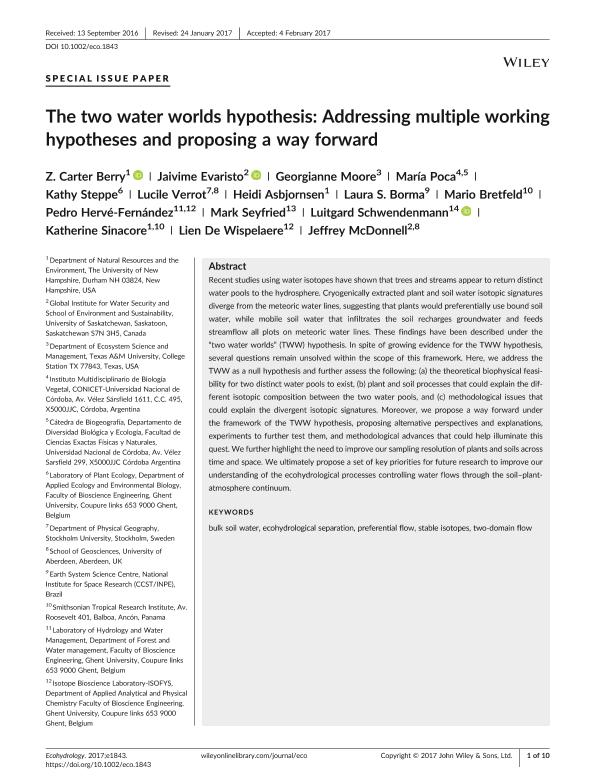Artículo
The two water worlds hypothesis: Addressing multiple working hypotheses and proposing a way forward
Berry, Z. Carter; Jaivime, Evaristo; Moore, Georgianne; Poca, María ; Steppe, Kathy; Verrot, Lucile; Asbjornsen, Heidi; Borma, Laura S.; Bretfeld, Mario; Hervé-Fernández, Pedro; Seyfried, Mark; Schwendenmann, Luitgard; Sinacore, Katherine; De Wispelaere, Lien; McDonnell, Jeffrey
; Steppe, Kathy; Verrot, Lucile; Asbjornsen, Heidi; Borma, Laura S.; Bretfeld, Mario; Hervé-Fernández, Pedro; Seyfried, Mark; Schwendenmann, Luitgard; Sinacore, Katherine; De Wispelaere, Lien; McDonnell, Jeffrey
 ; Steppe, Kathy; Verrot, Lucile; Asbjornsen, Heidi; Borma, Laura S.; Bretfeld, Mario; Hervé-Fernández, Pedro; Seyfried, Mark; Schwendenmann, Luitgard; Sinacore, Katherine; De Wispelaere, Lien; McDonnell, Jeffrey
; Steppe, Kathy; Verrot, Lucile; Asbjornsen, Heidi; Borma, Laura S.; Bretfeld, Mario; Hervé-Fernández, Pedro; Seyfried, Mark; Schwendenmann, Luitgard; Sinacore, Katherine; De Wispelaere, Lien; McDonnell, Jeffrey
Fecha de publicación:
03/2017
Editorial:
John Wiley & Sons Inc
Revista:
Ecohydrology
ISSN:
1936-0584
e-ISSN:
1936-0592
Idioma:
Inglés
Tipo de recurso:
Artículo publicado
Clasificación temática:
Resumen
Recent studies using water isotopes have shown that trees and streams appear to return distinct water pools to the hydrosphere. Cryogenically extracted plant and soil water isotopic signatures diverge from the meteoric water lines, suggesting that plants would preferentially use bound soil water, while mobile soil water that infiltrates the soil recharges groundwater and feeds streamflow all plots on meteoric water lines. These findings have been described under the ?two water worlds? (TWW) hypothesis. In spite of growing evidence for the TWW hypothesis, several questions remain unsolved within the scope of this framework. Here, we address the TWW as a null hypothesis and further assess the following: (a) the theoretical biophysical feasibility for two distinct water pools to exist, (b) plant and soil processes that could explain the different isotopic composition between the two water pools, and (c) methodological issues that could explain the divergent isotopic signatures. Moreover, we propose a way forward under the framework of the TWW hypothesis, proposing alternative perspectives and explanations, experiments to further test them, and methodological advances that could help illuminate this quest. We further highlight the need to improve our sampling resolution of plants and soils across time and space. We ultimately propose a set of key priorities for future research to improve our understanding of the ecohydrological processes controlling water flows through the soil?plant-atmosphere continuum.
Archivos asociados
Licencia
Identificadores
Colecciones
Articulos(IMBIV)
Articulos de INST.MULTIDISCIPL.DE BIOLOGIA VEGETAL (P)
Articulos de INST.MULTIDISCIPL.DE BIOLOGIA VEGETAL (P)
Citación
Berry, Z. Carter; Jaivime, Evaristo; Moore, Georgianne; Poca, María; Steppe, Kathy; et al.; The two water worlds hypothesis: Addressing multiple working hypotheses and proposing a way forward; John Wiley & Sons Inc; Ecohydrology; 3-2017
Compartir
Altmétricas



